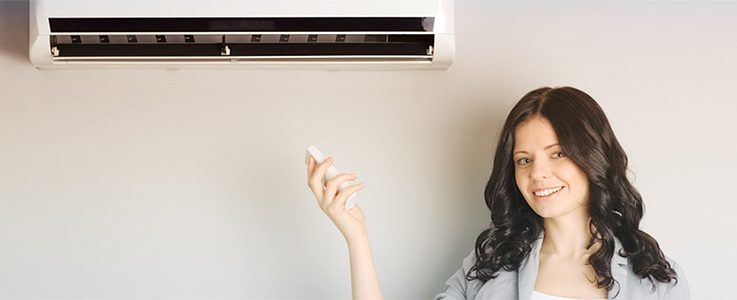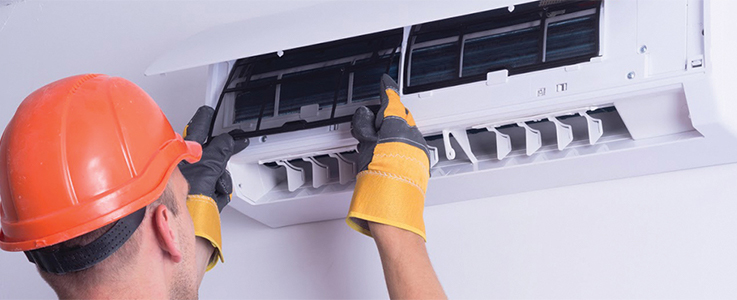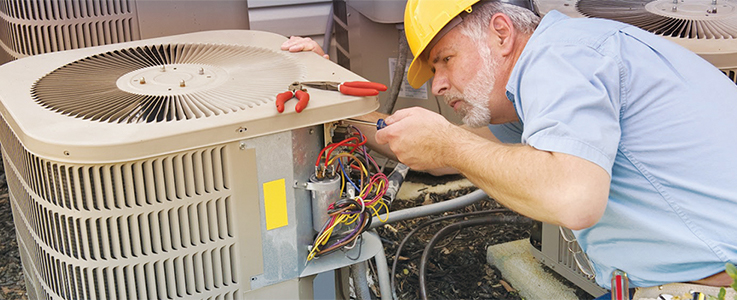Best Air Conditioners Companies
Use our guide to research the best air conditioner brand for you. We explain what to consider when shopping for an air conditioner, including the size of your home, the frequency of use, where you want the air conditioner unit located, energy efficiency and additional features like Wi-Fi or a smart display.
Air conditioners work by pulling hot air from inside the home outside. Central air conditioners circulate air throughout the whole house, while portable, wall and window units only circulate air in an area of the home. Air conditioners tend to last 10 to 20 years with routine maintenance and care.
- Our recommendations are based on what reviewers say.
- 4,337,775 reviews on ConsumerAffairs are verified.
- We require contact information to ensure our reviewers are real.
- We use intelligent software that helps us maintain the integrity of reviews.
- Our moderators read all reviews to verify quality and helpfulness.
Compare Reviews for Top Air Conditioners Companies | ||||||
|---|---|---|---|---|---|---|
Connects homeowners and renters with home improvement specialists for free. Average home improvement job costs between $120 and $6,000. Includes damage protection guarantee up to $500,000. Online booking available. |  | Get a Quote Call Center Open (866) 782-4077 | ||||
Haier is an international company that sells wall, ductless, PTAC and portable air conditioners to homeowners around the world. As a company, they have a commitment to sustainability and community. |  | Chat with a ConsumerAffairs decision guide Live agent | ||||
GE is a global industry leader that has been providing advanced technology in homes and businesses for over a century. They sell wall and window air conditioners for homeowners in addition to commercial air conditioners. |  | Chat with a ConsumerAffairs decision guide Live agent | ||||
Friedrich is an industry leading air conditioner manufacturer based in San Antonio, Texas. Founded in 1883, it offers residential and commercial air solutions including window units, portable units, ductless systems and more. | Chat with a ConsumerAffairs decision guide Live agent | |||||
LG sells portable, window and wall air conditioners to homeowners. They also sell accessories such as remote controls and 24-hour timers to improve your air conditioner’s accessibility and performance. |  | Chat with a ConsumerAffairs decision guide Live agent | ||||
Carrier’s innovation in heating and cooling technology dates back to 1881. They offer homeowners smart technology with professional installation along with energy audits to help them stay cool and save money. |  | Chat with a ConsumerAffairs decision guide Live agent | ||||
Trane has been innovating in heating and cooling technology since 1910. They specialize in home air solutions and continuously work to improve and advance their heating and cooling systems for homeowners. |  | Chat with a ConsumerAffairs decision guide Live agent | ||||
Goodman Manufacturing has been building heating and air conditioning equipment since 1982, including ductless and central air conditioning for homeowners. Their units are sold by independent contractors across the country. |  | Chat with a ConsumerAffairs decision guide Live agent | ||||
Frigidaire has been a major innovator of home technology since it was bought by General Motors in 1918. Their focus on energy-efficiency and smart technology promotes sustainability and helps homeowners save money. | Chat with a ConsumerAffairs decision guide Live agent | |||||
Lennox got its start in 1895 as a furnace manufacturer and introduced air conditioners to its customers in 1952. It is headquartered in Texas and offers homeowners energy efficient, money saving options on air conditioners. |  | Chat with a ConsumerAffairs decision guide Live agent | ||||
What air conditioner features matter most?
A/C unit size

Your A/C unit needs to be the right size to make sure your system has time to run through a full cycle without running constantly. An air conditioner’s capacity is measured in British Thermal Units (BTUs), which measures how much heat it takes to raise the temperature of one pound of water one degree Fahrenheit. In heating and cooling terms, one ton is equal to 12,000 BTUs. The size of the A/C unit you buy will be based on a few factors.
- Where you live: Location matters when it comes to picking out the right air conditioning unit for your home. For instance, a 1,000 square foot in the southern United States will need a larger A/C unit than a home of the same size in a northern state.
- Size of your home: A larger home will need a larger A/C unit than a smaller home to make sure the system runs efficiently and cools down the entire house. Small homes, including small apartments and condos, might do well with a window unit as opposed to a central air conditioning system.
- Ceiling height: Measurements that size A/C units generally assume the home has eight-foot ceilings. If your home has cathedral ceilings or ceilings that are higher than eight feet tall, you might need a bigger unit.
Price
When it comes to pricing your A/C unit, more expensive isn’t always better. There are a lot of factors that go into the price of an A/C unit that has nothing to do with quality.
- Size: In general, smaller A/C units are less expensive than larger ones because they are a small capacity. However, this doesn’t mean you should opt for a smaller unit than you need. You may save some upfront costs, but you will end up paying more each month since a unit that is smaller than you need will be less energy efficient.
- Seasonal Energy Efficiency Ratio (SEER): The SEER ratio determined by dividing an A/C unit’s total cooling output during a season by its total electric energy output. A higher resulting number will mean better performance. Units range from 13 to 27 SEER and are presented on a large yellow tag in stores. Units with higher SEER tend to cost more upfront than units with low SEER, so whether to invest in a more energy-efficient unit will depend on where you live. If you rarely use your A/C, you may never recoup the added upfront cost associated with a high SEER rating.
- Installer: How much you pay for installation will vary from company to company, so one of the most important factors for saving money on an A/C unit is to find an installer who will do the job well for the least amount of money. Read reviews, ask for references and get free quotes from reputable local installers. Paying less for installation isn’t worth it in the long run if the job isn’t done properly.
Installation

When installed correctly, your air conditioner should run smoothly for years with minimal maintenance. When installed incorrectly, however, your air conditioner will run inefficiently, costing you extra money and headaches over the course of its lifetime. There are several important factors to consider when choosing an installer for your A/C unit.
- In-home estimates: A good contractor will give you an estimate only after coming to your home to see the specifics of what you need done. Don’t trust a contractor who claims to offer over-the-phone estimates. Your in-home estimate should be a written bid that includes details such as what equipment needs to be installed, what work needs to be done and the total cost including labor.
- National affiliation: Most residential air conditioner contractors are affiliated with organizations such as Air Conditioning Contractors of America (ACCA) or the Sheet Metal and Air Conditioning Contractors’ National Association (SMACNA). The organizations’ websites will provide information on affiliated contractors in your area.
- Certification: Make sure your contractor and/or technician is certified by the North American Technical Excellence (NATE) and/or partnered with ENERGY STAR. NATE’s certification requires testing of real-world working knowledge of HVAC systems. While NATE does not directly supervise or work with technicians once they are certified, certified NATE technicians have been properly trained and tested on HVAC systems.
Energy efficiency
Energy-efficient air conditioners are a relatively recent development, so if you’re replacing a 20-year-old air conditioner, chances are this is new to you. A more energy-efficient air conditioner will cost more upfront, but it will save you money over the long run. If you live in a hot climate that uses A/C regularly, you will likely save money by investing in a more energy-efficient unit upfront. If, however, you live somewhere that rarely or only seasonally uses A/C, then a less expensive and less energy-efficient system might make the most sense. Energy efficiency is measured in two ways: Energy Efficiency Ratio (EER) and Seasonal Energy Efficiency Ratio (SEER).
- EER: EER has been used since the 1970s to measure energy efficiency. It is calculated by using a constant outside temperature of 95 degrees, a constant inside temperature of 80 degrees and a 50 percent humidity level. Because its calculations are based on constant temperatures and don’t take seasonal differences into account, EER is an objective measurement that can help you directly compare two different HVAC systems. However, it is generally not advertised and is used more by technicians during install than by salespeople for marketing.
- SEER: The SEER is the rating listed on the bright yellow tag on new HVAC units. It differs from EER in that, rather than using a constant indoor and outdoor temperature, it is calculated using the average over an entire cooling season. It does use a constant indoor temperature, like EER, but it calculates various outdoor temperatures that range from the 60s to over 100 degrees. Additionally, SEER includes US household energy uses and expenditures averages into its calculation.
Maintenance

Air conditioners can last up to 20 years or longer with the right preventative and routine maintenance. Homeowners should consider having a professional inspection every spring and fall and can do their own preventative maintenance year-round to keep their unit running smoothly.
- Air filters: The right air filter can make all the difference when it comes to maintaining your air conditioner. Spend a little extra for a high-efficiency pleated filter, which will trap even the tiniest particles, including bacterial. Check your filters monthly, and plan on changing them at least every 90 days.
- Spring and fall cleaning: Make a point to semi-annually do a thorough cleaning around your outdoor A/C unit. During this time, clear away any leaves and branches that have accumulated. Additionally, make sure your grass clippings stay clear of your unit. Finally, check to make sure your unit is still on level ground.
- Keep most vents open: Some people like to close vents in unused rooms to save on electric costs, but don’t close any more than 20 percent of the vents in your home. Closing too many vents can cause pressure to build up in your ducts, which can lead to serious problems like leakage, mold and mildew. Additionally, your A/C will actually end up working overtime because of the pressure, so you won’t really save any money.
Additional features
Your basic air conditioner will do its job of cooling down your house and filtering hot air outside. But a lot of air conditioners have added features that can add convenience to your life and keep your home’s environment healthy.
- Wi-Fi enabled: If you’re ready to turn your home into a smart home, you can start by investing in a Wi-Fi enabled air conditioner. These units are connected to an app so you can monitor your air conditioner remotely through your mobile device.
- Smart display: An air conditioner with a smart display makes it easy to see the temperature. Additionally, it will alert you when you need to clean your filters and when it detects leaking coolant.
- Filter sterilization: People with moderate to severe allergies will appreciate an air conditioner with filter sterilization for allergies. This feature removes every dust particle, even the tiniest ones, from the air in your home, along with allergy and viral disease-causing microbes.
What are different types of air conditioners?
Portable
These are free-standing, easy to move air conditioners that you can move from room to room. Because they need to vent hot air somewhere else, portable air conditioners are generally set up in windows and come with their own window kit. These are ideal for people who live in small spaces and/or only use air conditioning sporadically. They can be the most cost-efficient option since they only cool off one particular area instead of the entire home space. Some options even work double-duty by including heat so you can use it year-round.
Window
Traditionally found in college apartments and dorm rooms, today’s window air conditioners are energy efficient, quiet and overall easy on the eyes. They can be installed in any room with a window that leads to the outside and works by filtering hot air from inside outside through the window. Window air conditioners tend to feature a fan option, heater and programmable timer. They are an efficient and economical option for small spaces.
Wall
Wall air conditioners look similar to window units with the exception that they are mounted on an outdoor wall and therefore filter hot air outside through the wall instead of a window. They tend to be more energy-efficient than window units because they create an airtight seal that keeps hot air outside. One main difference is that these units are actually built into the wall, whereas window units can be installed and taken down. They are therefore a more permanent option than window units.
Ductless mini-split
Unlike portable, window or through the wall units, the ductless mini-split model is not an actual unit that can be installed in one room or another. They are capable of cooling more than one room at a time, similar to central units, but they don’t require ductwork. They are made up of two main parts: a large condenser unit that needs to be installed outside and one (or more) compact blower units that can be mounted on the wall or ceiling. These mounted units are placed strategically inside the rooms or zones you want and can be controlled separately, so you can only cool the spaces you are using to save energy costs.
Central
Central air conditioning units are popular for homeowners who need to cool several rooms at the same time. These systems are fully ducted, making them a more expensive option than portable or split units but can be the best choice overall for larger homes. They work by first extracting warm air from all over your house to cool at a central point and then distributing that cool air to your house through a series of vents and ducts. The hot air is then filtered outside.
Packaged Terminal Air Conditioner (PTAC)
Commonly found in hotel and motel rooms, senior living facilities, hospitals, condominiums and apartment buildings, PTACs are an all-in-one air conditioner/heating unit. They are commonly installed in walls and windows.
Who would benefit from an air conditioner?
Homeowners
Homeowners will likely want to invest in central air conditioning since it can cool down their entire house at the same time.
Apartment dwellers
People who live in apartments will enjoy the convenience and efficiency of a portable or window air conditioning unit so they can cool off wherever they are without wasting energy cooling off their entire living space.
Senior citizens
Senior citizens are at higher risk for heatstroke and other heat-related illnesses, making it necessary for them to have quick and easy access to an air conditioner. A ductless air conditioner unit is easy to install and maintain and is ideal for smaller living spaces. A portable unit can also work well for senior citizens who only need to cool a small space.
People who live in hot climates
A reliable air conditioner is a must for anyone living in a hot climate to prevent illnesses that can result from overheating.
Businesses
Businesses need a commercial air conditioner to keep their employees happy and their offices and equipment cool. Hotels, hospitals, apartments and condominiums will benefit from PTAC systems to cool individual rooms.
Thanks for subscribing.
You have successfully subscribed to our newsletter! Enjoy reading our tips and recommendations.
Information in this guide is general in nature and is intended for informational purposes only; it is not legal, health, investment or tax advice. ConsumerAffairs.com makes no representation as to the accuracy of the information provided and assumes no liability for any damages or loss arising from its use.
Want your company to be on this guide?
Yes, continueYou’re signed up
We’ll start sending you the news you need delivered straight to you. We value your privacy. Unsubscribe easily.



